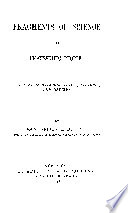 Heat is a very brisk agitation of the insensible parts of the object, which produces in us that sensation from whence we denominate the object hot ; so what in our sensation, is heat, in the object is nothing but motion. Heat is a very brisk agitation of the insensible parts of the object, which produces in us that sensation from whence we denominate the object hot ; so what in our sensation, is heat, in the object is nothing but motion.  Text-book on the Steam Engine - Page 51by Thomas Minchin Goodeve - 1879 - 296 pagesFull view Text-book on the Steam Engine - Page 51by Thomas Minchin Goodeve - 1879 - 296 pagesFull view - About this book
 | John Tyndall - 1871 - 438 pages
...brisk agitation of the insensible parts of the object, which produce in us that sensation from which we denominate the object hot : so what in our sensation is heat in the object is nothing but motion." When the electric current, still feeble, begins to pass through the wire, its first act is to intensify... | |
 | John Tyndall - 1871 - 436 pages
...beyond the pale of doubt by the excellent quantitative researches of Mr. Joule. " Heat," says Locke, " is a very brisk agitation of the insensible parts of the object, which produce in us that sensation from which we denominate the object hot: so what in our sensation is heat... | |
 | James Prescott Joule - 1872 - 148 pages
...haben werden. Ueber das mechanische Aequiva1ent der Wärme. Philosophical Transaction, 1850, p. 61 ff. „Heat is a very brisk agitation of the insensible...sensation is heat, in the object is nothing but motion." Locke. „Wärme ist eine sehr lebhafte Bewegung der unwahrnehmbar kleinen Theile eines Gegenstandes,... | |
 | Henry Charlton Bastian - 1872 - 526 pages
...bodies V Locke, also, shortly afterwards, expressed himself in much the same terms. He said : — ' Heat is a very brisk agitation of the insensible parts...in us that sensation from whence we denominate the subject hot; so that what in our sensation is heat, in the object is nothing but motion.' But it was... | |
 | Henry Charlton Bastian - 1872 - 578 pages
...of bodies V Locke, also, shortly afterwards, expressed himself in much the same terms. He said: — 'Heat is a very brisk agitation of the insensible...in us that sensation from whence we denominate the subject hot; so that what in our sensation is heat^ in the object is nothing but motion.' But it was... | |
 | James Prescott Joule - 1872 - 152 pages
...the insensible parts of the object, which produces in us that Sensation, i'rom whence \ve <lenominate the object hot ; so what in our Sensation is heat, in the object is nothing but moüon." Locke. „Wanne ist eine sehr lebhafte Bewegung der unwahrnehmbar kleinen Theile eines Gegenstandes,... | |
 | George Farrer Rodwell - 1873 - 752 pages
...have fully recognized the theory which considers heat as a motion of matter. " Heat," he says, " ia a very brisk agitation of the insensible parts of...sensation from whence we denominate the object hot; so that, what in our sensation is heat, in the object is uotling but motion." Thus far we have spoken... | |
 | John Tyndall - 1873 - 582 pages
...held a view of this kind,* and Locke stated a similar view with singular felicity. " Heat," he says, " is a very brisk agitation of the insensible parts...which produces in us that sensation from whence we demonstrate the object hot : so, what iii our sensation is //.'//, in the object is nothing but motion."... | |
 | James Nasmyth, James Carpenter - 1874 - 308 pages
...motion and nothing else." Locke defines heat as "a very brisk agitation of the insensible parts of an object, which produces in us that sensation from whence...sensation is heat, in the object is nothing but motion." Descartes and his followers upheld a similar opinion. Richard Boyle, two hundred years ago, actually... | |
 | Victoria Institute (Great Britain) - 1876 - 486 pages
...to speak for itself. I say at the close of the 23rd section of my paper "John Locke writes:—'Heat is a very brisk agitation of the insensible parts...whence we denominate the object "hot" ; so what in our own sensation is heat, in the object is nothing but motion.' It would be, perhaps, still more precise... | |
| |